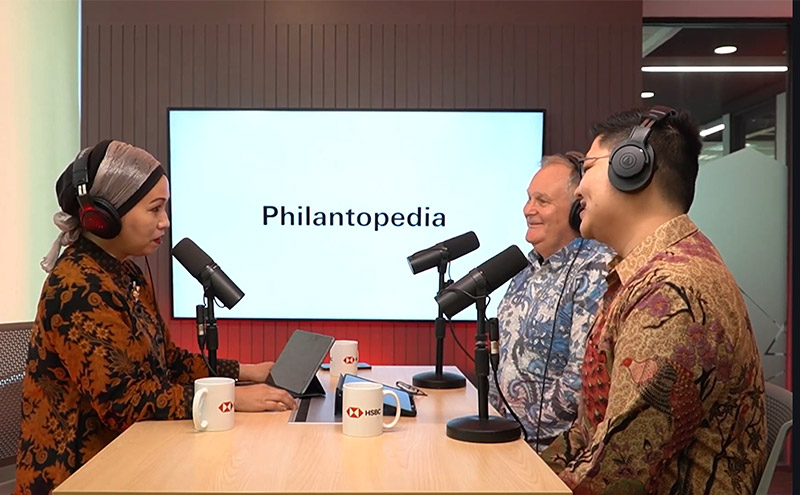HSBC Philantopedia podcast, 2nd episode: Beyond the textbook

Read the transcript (8-page PDF 109KB)
Watch this episode of the podcast that highlights the importance of the younger generation in building practical skills through experiential learning to effectively prepare themselves to enter the workforce. In supporting this, HSBC Indonesia established partnerships to run various philanthropic programmes targeting across education levels to equip the younger generation with relevant skills for the future.
Find out more through the following article.
Preparing future leaders by embedding practical skills.
Amid the dynamics of the ever-evolving world of work, there is a visible gap between the competencies of new graduates and the needs of industry. In Indonesia, this challenge is not caused by a lack of education but rather by the need to increase the relevance of materials taught in educational institutions with professional demands in the field. This is often referred to as the harmonisation between the world of education and the world of work.
Companies today are looking beyond just academic qualifications. They need individuals who can think critically, adaptively respond to changes, master technology, and work collaboratively across disciplines. Especially now, when industry is increasingly reliant on data and technology, companies need workers who not only have deep technical literacy but are also well skilled in using specialised software, data analytics platforms, or innovative technologies such as artificial intelligence (AI).
At the same time, many university graduates may require further training in more practical aspects. They enter the workforce with only a general knowledge of basic software, without hands-on experience with the specialised tools that can drive efficiency and innovation in various industry sectors.
However, this issue is not limited to technical matters. Some new graduates also face challenges in applying professional ethics, communicating effectively in a team, and applying critical thinking to solve complex problems. In fact, these skills are very important to adapt to company cultures, build productive collaboration, and grow into future leaders.
This is the focal point where education and the industrial sector meet. The curriculum should be more flexible and responsive to current developments. The application of experiential learning, or learning based on experience, plays a crucial role in bridging the gap between theoretical ability and practical skills. Through this approach, students not only understand concepts but also practise them in real scenarios, develop problem-solving skills, decision-making abilities, and teamwork. The world of work increasingly emphasises practical skills through project-based programmes, internships, and mentoring. The young generation will also be able to develop internally to continuously learn, elevate their knowledge, and understand that success is not only about capabilities, but it is also about how they build their character wisely. Collaboration becomes the key to reducing this gap. Educational institutions and industry partners can work more intensively by integrating more practical projects, internship programmes, and joint work programmes.
In today’s era of rapid technological advancement, the ability to manage finances becomes an essential skill, especially for the younger generation. The presence of the engagement economy makes financial literacy increasingly relevant to possess. Understanding the basics of financial management is fundamental and helps, especially the younger generation, to manage income, expenses, and long-term financial goals. The aim is to equip the younger generation with practical financial skills that can be applied in real life, not just as theoretical knowledge.
HSBC believes that building a resilient economic future begins with preparing equally resilient people. Therefore, HSBC is committed to developing future business leaders as part of sustainable business management. Through various social initiatives and partnerships with educational institutions and communities, HSBC strives to encourage the emergence of young talents who are ready to face global challenges equipped with financial literacy, leadership, and a passion for entrepreneurship.
Student Seminar on personal branding and career, as part of HSBC Business Case Competition 2025, was held featuring one of HSBC Senior Leaders.
One example of this commitment is the HSBC Business Case Competition. This program is an international business case study competition designed to assess students’ abilities in analysing complex business challenges, developing strategic solutions, and presenting their ideas effectively. Through this competition, students gain valuable practical experience, hone their critical thinking, analytical, and communication skills while directly interacting with industry professionals.
One of the university teams in the competition presented solution to a complex case showcasing innovative thinking, teamwork, and resilience.
University students attended interactive session with HSBC Senior Leaders during corporate excursion to explore the heart of banking.
The future requires leaders who are not only intelligent but also wise and adaptive. Preparing them is a long-term investment whose value extends beyond numbers, because ultimately, the future of business greatly depends on the future of its human resources.
Proud moment of the competition winner which team would further represent Indonesia in the international stage.